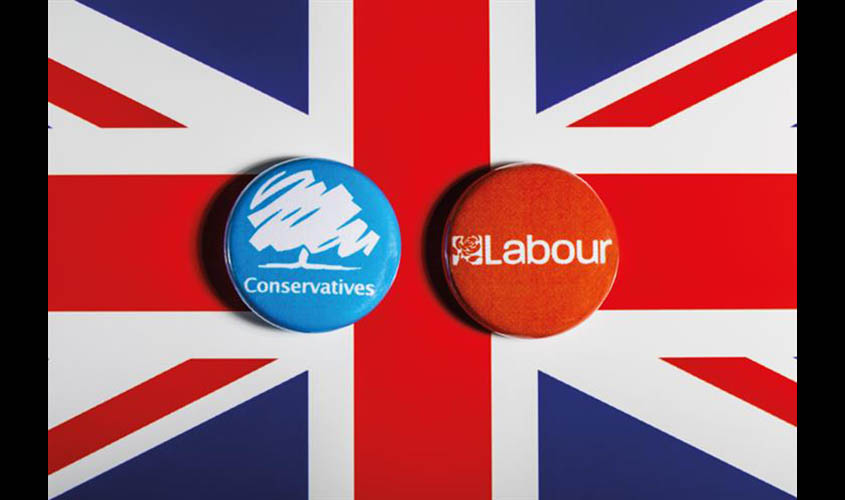With the UK on the cusp of yet another general election, British politics could not be more unpredictable. A number of groups are very much “in play”, as bonds of party identification continue to fray. This includes pro-Brexit traditional Labour voters in the provincial Midlands, Northern England, and Wales, who feel utterly abandoned by the party’s position on EU membership. But there is another part of the UK’s “volatile” electorate which has come to represent a key “Labour-Conservative” battleground—Britain’s Indian Hindus.
Highly-educated and upwardly mobile, this part of the population is very much a success story. Much of Britain’s Indian Hindu community can trace their origins back to the western Indian state of Gujarat, with some also being first-generation migrants who fled the aggressive processes of “Africanisation” under East African dictatorships. Historically, Labour has been able to rely on the support of British Indian Hindus for some time—largely a legacy of the party’s passage of race relations legislation and its broader “anti-discrimination” reputation. However, this party-voter relationship is under strain. There has been a steady movement of voters away from Labour, as British Indian Hindus have become more willing to give the Conservatives a hearing. Indeed, research produced by London-based think-tank Runnymede Trust has shown that the Conservative vote share among British voters of Indian origin is steadily on the rise, while Labour support among British voters of Pakistani and Bangladeshi origin has risen even further in recent times—particularly under Jeremy Corbyn’s leadership.
This is in part due to upward mobility and economic self-sufficiency. British Indian Hindus in the conventional workforce are more likely to be salaried professionals when compared to other ethno-religious groups. For example, British workers of Pakistani and Bangladeshi Muslim origin continue to be relatively concentrated in lower-paid sections of the transport, hospitality and industrial sectors. Recent figures have shown that 32% of British Indian women aged 16-64 are “economically inactive”. To put this in perspective, the corresponding figure for a merged British “Pakistani-Bangladeshi” category was 59%. While fertility rates of the UK’s Bangladeshi and Pakistani communities are relatively high, the British Indian fertility rate is considerably lower.
When combining the realities of greater occupational advancement, low fertility rates, and relatively high female economic activity, the archetypal British Indian household is comparatively small, two-income, self-sufficient, and minimally reliant on welfare assistance. So comprehensive welfare commitments, which are likely to be a central feature of Labour’s future general election manifesto, are unlikely to appeal to a great number of British Indian voters—including well-resourced people of Gujarati Hindu origin.
In recent times, there has been a concerted Tory effort to woo this strategically important group of voters. Former British PM David Cameron hosted Indian Premier Narendra Modi at a packed Wembley Stadium —with Cameron even mustering a few words of Gujarati as he introduced his guest. Both Cameron and his successor Theresa May emphasised the importance of UK-India relations, with such ties being of major importance to “post-Brexit Britain”.
Also, we must not underestimate the impact of socio-cultural and religious factors on electoral support in the British context. While this may not be so much the case among British-born Indian Hindus, such determinants may be more influential for first-generation migrants. It is no secret that Labour leader Jeremy Corbyn has little time for Prime Minister Modi. In 2013, when he was a backbench MP, Corbyn signed a parliamentary motion calling on the UK government to reinstate its diplomatic boycott of PM Modi, “given his role [as Chief Minister of Gujarat] in the communal violence in the 2002 [Gujarat] riots which claimed the lives of hundreds if not thousands of Muslims”. During PM Modi’s November 2015 address to UK Parliament, Corbyn—back then the recently-elected leader of the Labour Party—was not even present in the royal gallery.
Labour has also pledged to outlaw “caste discrimination” in the UK—which is seen by some British Indian Hindus as unnecessary political meddling and interference into sensitive community matters. Corbyn’s selective outrage—expressing vocal opposition to the caste system, combined with his relative disquiet over persisting forms of sectarian victimisation within British Muslim communities—has put him at odds with a good number of Britain’s Indian Hindus, who have found the Conservatives more sympathetic to their concerns.
It is also important to take note of the broader “culture shift” within the Labour Party. Last month, Labour conference passed a motion which called for “international intervention in Kashmir” and condemned the “recent actions of the Government of India to revoke Article 370”. Despite being self-styled “defenders” of minority rights, such activists have completely ignored the history of persecution of non-Muslim groups, such as Kashmiri Pandits, under growing Islamist influences in the region.
While Labour’s domestic and foreign policy positions will help to solidify its “rock red” British Pakistani and Bangladeshi Muslim base in inner-city areas and Northern English towns such as Blackburn and Rochdale, it may well alienate a considerable proportion of British Indian Hindus in marginal London constituencies such as Harrow East and Hendon, as well as “swing towns” such as Milton Keynes and Watford.
A Conservative Party which champions the contribution made by small-to-medium-sized enterprises, celebrates academic achievement, adopts a robust approach to tackling Islamist influences in the UK, and emphasises the importance of UK-India diplomatic and trading relations in the post-Brexit context, may win the hearts and minds of many British Indian Hindus.
With the right policy offerings, the next general election could well mark a full Tory takeover of Labour’s fraying Indian Hindu estate.
Dr Rakib Ehsan is a research fellow at the Henry Jackson Society, a multi-centre think-tank based in London, UK.

